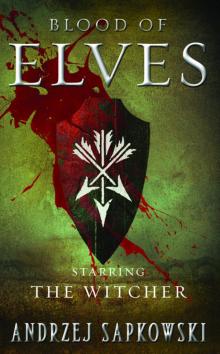- Home
- Andrzej Sapkowski
Season of Storms Page 3
Season of Storms Read online
Page 3
The table that the head waiter sat him at had a tablecloth. All the tables in the Natura Rerum—most of which were occupied—had tablecloths. Geralt couldn’t recall the last time he’d seen any in a tavern.
Although curious, he didn’t look around, not wanting to appear provincial and uncouth. However, a cautious glance revealed modest—though elegant and tasteful—decor. The clientele, whom he judged to be mainly merchants and craftsmen, were also elegantly—although not always tastefully—attired. There were ships’ captains, weather-beaten and bearded. And there was no shortage of garishly dressed noblemen. It smelled nice and elegant: of roast meat, garlic, caraway and big money.
He felt eyes on him. His witcher senses immediately signalled whenever he was being observed. He had a quick, discreet look around.
A young woman with fox-red hair was observing him, also very discreetly, and to an ordinary mortal imperceptibly. She was pretending to be completely absorbed in her meal—something tasty looking and temptingly fragrant even from a distance. Her style and body language left no doubt. Not to a witcher. He would have bet anything she was a sorceress.
The head waiter shook him out of his contemplation and sudden nostalgia.
“Today,” he announced ceremonially and not without pride, “we propose veal shank stewed in vegetables with mushrooms and beans. Saddle of lamb roast with aubergines. Bacon in beer served with glazed plums. Roast shoulder of boar, served with stewed apples. Fried duck breasts, served with red cabbage and cranberries. Squid stuffed with chicory in a white sauce served with grapes. Grilled monkfish in a cream sauce, served with stewed pears. Or as usual, our speciality: goose legs in white wine, with a choice of baked fruit, and turbot in caramelised cuttlefish ink, served with crayfish necks.”
“If you have a liking for fish,” Febus Ravenga suddenly appeared at the table out of the blue, “I heartily recommend the turbot. From the morning catch, it goes without saying. The pride and boast of our head chef.”
“The turbot in ink then.” The Witcher fought against an irrational desire to order several dishes in one go, aware it would have been in bad taste. “Thank you for the suggestion. I’d begun to suffer the agony of choice.”
“Which wine,” the head waiter asked, “would sir like to order?”
“Please choose something suitable. I’m not very au fait with wines.”
“Few are,” smiled Febus Ravenga. “And very few admit it. Never fear, we shall choose the type and vintage, Master Witcher. I’ll leave you in peace, bon appétit.”
That wish was not to come true. Neither did Geralt have the opportunity to find out what wine they would choose. The taste of turbot in cuttlefish ink was also to remain a mystery to him that day.
The red-haired woman suddenly abandoned discretion, as her eyes found his. She smiled. Spitefully, he couldn’t help feeling. He felt a quiver run through him.
“The Witcher called Geralt of Rivia?” The question was asked by one of three characters dressed in black who had noiselessly approached the table.
“It is I.”
“You are arrested in the name of the law.”
What judgment shall I dread, doing no wrong?
William Shakespeare, The Merchant of Venice
CHAPTER THREE
Geralt’s court-appointed barrister avoided eye contact. She flicked through the portfolio of documents with a persistence worthy of a better cause. There were very few papers in it. Two, to be precise. His lawyer had probably learned them by heart. To dazzle them with her speech for the defence, he hoped. But that was, he suspected, a forlorn hope.
“You assaulted two of your cellmates while under arrest.” His lawyer finally raised her eyes. “Ought I perhaps to know the reason?”
“Primo, I rejected their sexual advances. They didn’t want to understand that ‘no’ means ‘no.’ Secundo, I like beating people up. Tertio, it’s a falsehood. They self-inflicted their wounds. By banging themselves against the wall. To slander me.”
He spoke slowly and carelessly. After a week spent in prison he had become utterly indifferent.
His barrister closed the portfolio. Only to open it again straight away. Then she tidied her elaborate coiffure.
“The victims aren’t pressing charges, it transpires.” She sighed. “Let us focus on the prosecutor’s charge. The tribunal assessor is accusing you of a grave crime, punishable by a severe penalty.”
How could it be otherwise? he thought, contemplating the lawyer’s features. He wondered how old she had been when she entered the school for sorcerers. And how old she was when she left.
The two schools for sorcerers—Ban Ard School for boys and Aretuza School for girls, both on the Isle of Thanedd—apart from male and female graduates, also produced rejects. In spite of the strict selection procedure of their entry examinations, which was supposed to facilitate the winnowing out and discarding of hopeless cases, it was only the first semesters that really found and revealed the ones who had managed to remain hidden. The ones for whom thinking turned out to be a disagreeable and hazardous experience. Latent idiots, sluggards and intellectual slackers of both sexes, who had no place in schools of magic. The difficulty was that they were usually the offspring of wealthy people or considered important for other reasons. After being expelled from school it was necessary to do something with these difficult youngsters. There was no problem for the boys rejected by Ban Ard—they joined the diplomatic service, the army, navy or police while politics was left for the stupidest. Magical rejects in the shape of the fairer sex seemed to be more difficult to place. Although expelled, the young ladies had nonetheless crossed the threshold of a school of magic and had tasted magic to some degree or other. And the influence of sorceresses on monarchs, and on all areas of political and economic life, was too powerful for the young ladies to be left in the lurch. They were provided with a safe haven. They joined the judiciary. They became lawyers.
The defence counsel closed the portfolio. Then opened it.
“I recommend an admission of guilt,” she said. “Then we can expect a more lenient punishment—”
“Admit to what?” interrupted the Witcher.
“When the judge asks if you plead guilty you are to reply in the affirmative. An admission of guilt will be regarded as a mitigating circumstance.”
“How do you mean to defend me, then?”
The lawyer closed the portfolio. As though it were a coffin lid.
“Let’s go. The judge is waiting.”
The judge was waiting. For right then the previous miscreant was being escorted from the courtroom. He looks none too cheerful, thought Geralt.
A shield flecked with flies bearing the emblem of Kerack, a blue dolphin naiant, hung on the wall. Under the coat of arms was the bench, with three people sitting behind it. A scrawny scribe. A faded subjudge. And the judge, a woman of equable appearance and countenance.
The bench on the judges’ right was occupied by the tribunal assessor, acting as prosecutor. He looked serious. Serious enough to avoid an encounter with him in a dark alley.
On the other side, on the judges’ left, was the dock. The place assigned to Geralt.
Things moved quickly after that.
“Geralt, called Geralt of Rivia, a witcher by profession, is accused of embezzlement, of the seizure and misappropriation of Crown property. Acting in league with other persons whom he corrupted, the accused inflated the fees on the bills issued for his services with the intention of arrogating those surpluses. Which resulted in losses to the state treasury. The proof is a report, notitia criminis, that the prosecution has enclosed in the file. That report …”
The judge’s weary expression and absent gaze clearly showed that this respectable lady was miles away. And that quite other matters and problems were distressing her: the laundry, the children, the colour of the curtains, preparing the dough for a poppy-seed cake and the stretch marks on her large behind auguring a marital crisis. The Witcher humbly accepted the fact that
he was less important. That he could not compete with anything of that kind.
“The crime committed by the accused,” the prosecutor continued without emotion, “not only damages the country, but also undermines the social order and spreads dissent. The law demands—”
“The report included in the file,” interrupted the judge, “has to be treated by the court as probatio de relato, evidence supplied by a third party. Can the prosecution supply any other proof?”
“There is no other evidence … For the moment … The accused is, as has been pointed out, a witcher. He is a mutant, beyond the margins of human society, flouting human laws and placing himself above them. In his criminogenic and antisocial profession, he communes with criminals, as well as non-humans, including races traditionally hostile to humanity. Law-breaking is part of a witcher’s nihilistic nature. In the case of this witcher, Your Honour, the lack of evidence is the best proof … It proves perfidy and—”
“Does the accused …” The judge was clearly uninterested in whatever the lack of evidence proved. “Does the accused plead guilty?”
“He does not.” Geralt ignored his lawyer’s desperate signals. “I am innocent; I haven’t committed any crime.”
He had some skill, he had dealt with the law. He had also familiarised himself with the literature on the subject.
“I am accused on the basis of prejudice—”
“Objection!” yelled the assessor. “The accused is making a speech!”
“Objection dismissed.”
“—as a result of prejudice against my person and my profession, i.e. as a result of praeiudicium. Praeiudicium implies, in advance, a falsehood. Furthermore, I stand accused on the grounds of an anonymous denunciation, and only one. Testimonium unius non valet. Testis unus, testis nullus. Ergo, it is not an accusation, but conjecture, i.e. praesumptio. And conjecture leaves doubt.”
“In dubio pro reo!” the defence counsel roused herself. “In dubio pro reo, Your Honour!”
“The court has decided to set bail of five hundred Novigradian crowns.” The judge struck her gavel on the bench, waking up the faded subjudge.
Geralt sighed. He wondered if both his cellmates had come around and drawn any kind of lesson from the matter. Or whether he would have to give them another hiding.
What is the city but the people?
William Shakespeare, Coriolanus
CHAPTER FOUR
A stall carelessly nailed together from planks, manned by an old dear in a straw hat and as plump and ruddy-faced as a good witch from a fairy tale, stood at the very edge of the crowded marketplace. The sign above the old dear read: Come to me for joy and happiness. Gherkin complimentary. Geralt stopped and dug some copper pennies from his pocket.
“Pour me a gill of happiness, Granny,” he demanded gloomily.
He took a deep breath, downed it in one, and breathed out. He wiped away the tears that the hooch brought to his eyes.
He was at liberty. And angry.
He had learned that he was free, interestingly, from a person he knew. By sight. It was the same prematurely bald young man who he had observed being driven from the steps of the Natura Rerum osteria. And who, it turned out, was the court scribe.
“You’re free,” the bald young man had told him, locking and unlocking his thin, ink-stained fingers. “Someone came up with the bail.”
“Who?”
The information turned out to be confidential—the bald scribbler refused to give it. He also refused—rather bluntly—the return of Geralt’s confiscated purse. Which contained cash and bank cheques among other things. The Witcher’s personal property—he declared not without spitefulness—had been treated by the authorities as a cautio pro expensis, a down payment against court costs and expected penalties.
There was no point or purpose in arguing. On release, Geralt had to content himself with what he had in his pockets when he was arrested. Personal trifles and petty cash. So petty no one had bothered to steal it.
He counted the remaining copper pennies and smiled at the old dear.
“And a gill of joy, please. I’ll decline the gherkin.”
After the old dear’s hooch, the world took on a more beautiful hue. Geralt knew it would quickly pass so he quickened his step. He had things to do.
Roach, his mare, had fortunately escaped the attentions of the court and wasn’t included in the cost of the cautio pro expensis. She was where he’d left her, in the stable stall, well-groomed and fed. The Witcher couldn’t accept something like that without a reward, irrespective of his own assets. The stableman received at once a few of the handful of silver coins that had survived in a hiding place sewn into the saddle. Geralt’s generosity took the man’s breath away.
The horizon over the sea was darkening. It seemed to Geralt that he could see flashes of lightning there.
Before entering the guardhouse, he prudently filled his lungs with fresh air. It didn’t help. The guardswomen must have eaten more beans than usual that day. Many, many more beans. Who knew, perhaps it was Sunday.
Some of them were eating, as usual. Others were busy playing dice. They stood up from the table upon seeing him. And surrounded him.
“The Witcher, just look,” said the commandant, standing very close. “’e’s up and come here.”
“I’m leaving the city. I’ve come to collect my property.”
“If we lets you.” Another guard prodded him with an elbow, apparently by accident. “What will ’e give us for it? You’ll have to buy yourself out, sonny, buy yourself out! Eh, lasses? What’ll we make him do?”
“Kiss all our bare arses!”
“With a lick! And a dick!”
“Nothing of the kind! He might infect us with something.”
“But he’ll ’ave to give some pleasure, won’t ’e?” Another one pushed her rock-hard bust onto him.
“He can sing us an air.” Another one farted thunderously. “And fit the tune to my pitch!”
“Or mine!” Yet another one farted even louder. “Mine’s more full-blooded!”
The other women laughed so much they clasped their sides.
Geralt made his way through, trying hard not to use excessive force. At that moment, the door to the deposit opened and an elderly gentleman in a grey mantle and beret appeared. The attendant, Gonschorek. On seeing the Witcher he opened his mouth wide.
“You, sir?” he mumbled. “How so? Your swords …”
“Indeed. My swords. May I have them?”
“But … But …” Gonschorek choked and clutched his chest, struggling to catch his breath. “But I don’t have the swords!”
“I beg your pardon?”
“I don’t have them …” Gonschorek’s face flushed. And contorted as though in a paroxysm of pain. “Them bin took—”
“What?” Geralt felt cold fury gripping him.
“Bin … took …”
“What do you mean, taken?” He grabbed the attendant by the lapels. “Taken by whom, dammit? What the bloody hell is this about?”
“The docket …”
“Exactly!” He felt an iron grip on his arm. The commandant of the guard shoved him away from the choking Gonschorek.
“Exactly! Show us the docket!”
The Witcher did not have the docket. The docket from the weapon store had been in his purse. The purse the court had confiscated. Against the costs and the expected punishments.
“The docket!”
“I don’t have it. But—”
“No docket, no deposit.” The commandant didn’t let him finish. “Swords bin took, didn’t you ’ear? You probably took ’em. And now you’re putting on this pantomime? Want to con something out of us? Nothing doing. Get out of here.”
“I’m not leaving until …”
The commandant, without loosening her grasp, dragged Geralt away and turned him around. To face the door.
“Fuck off.”
Geralt shied away from hitting women. He didn’t, however, have any r
eluctance when it came to somebody who had the shoulders of a wrestler, a belly like a netted pork roast and calves like a discus thrower, and on top of that who farted like a mule. He pushed the commandant away and smashed her hard in the jaw. With his favourite right hook.
The others froze, but only for a second. Even before the commandant had tumbled onto the table, splashing beans and paprika sauce around, they were on him. He smashed one of them in the nose without thinking, and hit another so hard her teeth made a cracking noise. He treated two to the Aard Sign. They flew like rag dolls into a stand of halberds, knocking them all over with an indescribable crash and clatter.
He got hit in the ear by the commandant, who was dripping sauce. The other guard, the one with the rock-hard bust, seized him from behind in a bear hug. He elbowed her so hard she howled. He pushed the commandant onto the table again, and whacked her with a haymaker. He thumped the one with the smashed nose in the solar plexus and knocked her to the ground, where she vomited audibly. Another, struck in the temple, slammed her head against a post and went limp, her eyes immediately misting over.
But four of them were still on their feet. That marked the end of his advantage. He was hit in the back of the head and then in the ear. And after that in the lower back. One of them tripped him up and when he fell down two dropped on him, pinning him down and pounding him with their fists. The other two weighed in with kicks.
A head-butt in the face took out one of the women lying on him, but the other immediately pressed him down. The commandant—he recognised her by the sauce dripping from her. She smacked him from above in the teeth. He spat blood right in her eyes.
“A knife!” she yelled, thrashing her shaven head around. “Give me a knife! I’ll cut his balls off!”
“Why a knife?” yelled another. “I’ll bite them off!”
“Stop! Attention! What is the meaning of this? Attention, I said!”
A stentorian voice, commanding respect, tore through the hubbub of the fracas, pacifying the guards. They released Geralt from their grasp. He got up with difficulty, somewhat sore. The sight of the battlefield improved his humour a little. He observed his accomplishments with some satisfaction. The guard lying by the wall had opened her eyes, but was still unable even to sit upright. Another, bent over, was spitting blood and feeling her teeth with a finger. Yet another, the one with the smashed nose, was trying hard to stand, but kept falling over, slipping in a puddle of her own beany vomit. Only three of the six could keep their balance. So he could be satisfied with the result. Despite the fact that had it not been for the intervention he would have suffered more serious injuries and might not have been able to get up unaided.

 something ends something begins sapkowski
something ends something begins sapkowski The Last Wish
The Last Wish Baptism of Fire
Baptism of Fire Blood of Elves
Blood of Elves Lastavičja Kula
Lastavičja Kula Gospodarica Jezera
Gospodarica Jezera Vatreno Krštenje
Vatreno Krštenje Sezona Oluja
Sezona Oluja Lady of the Lake
Lady of the Lake The Road With No Return
The Road With No Return Time of Contempt
Time of Contempt Mač Sudbine
Mač Sudbine The Malady and Other Stories: An Andrzej Sapkowski Sampler
The Malady and Other Stories: An Andrzej Sapkowski Sampler The Saga of the Witcher
The Saga of the Witcher The Tower of Fools
The Tower of Fools Vreme Prezira
Vreme Prezira Introducing the Witcher
Introducing the Witcher Stephen Hulin
Stephen Hulin The Time of Contempt
The Time of Contempt The Sword of Destiny
The Sword of Destiny Season of Storms
Season of Storms The Tower of Swallows
The Tower of Swallows The Last Wish: Introducing The Witcher
The Last Wish: Introducing The Witcher The Lady of the Lake
The Lady of the Lake